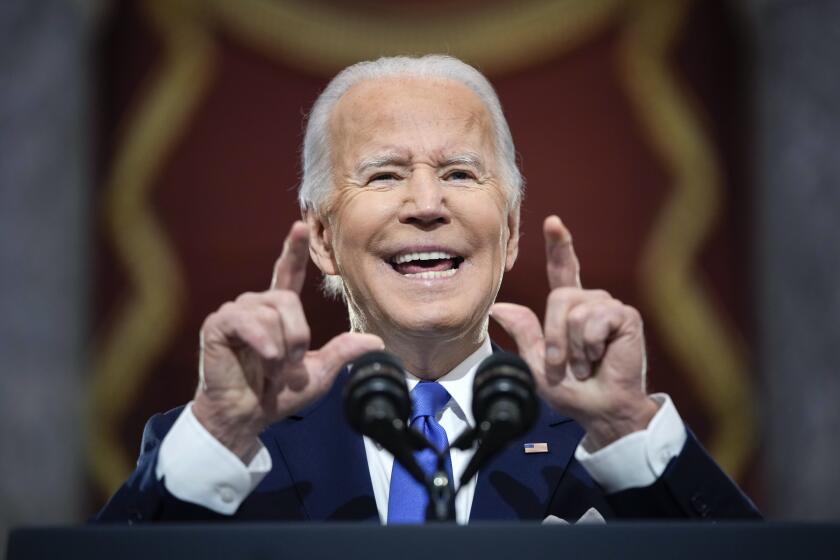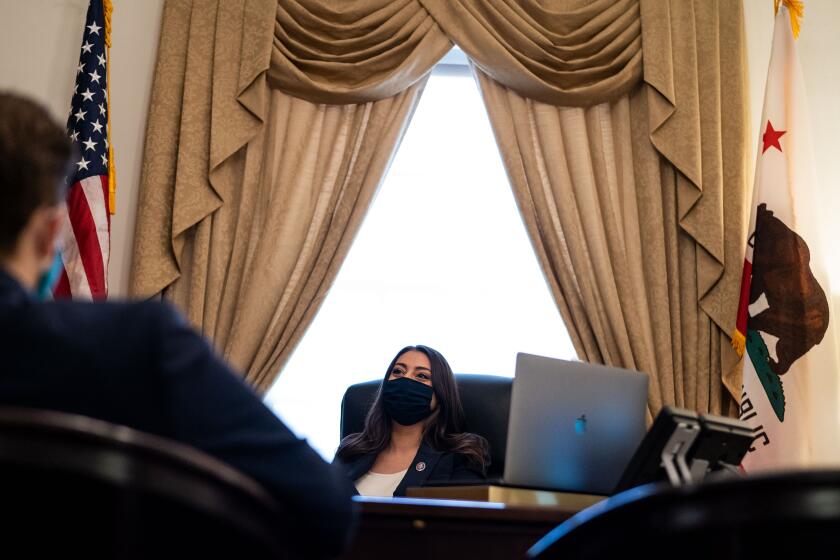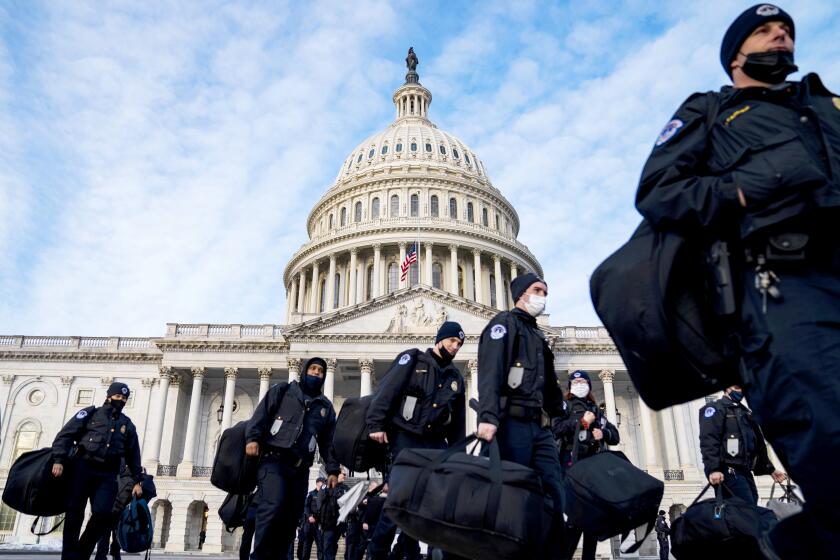Nation finds no solace a year after Jan. 6 attack
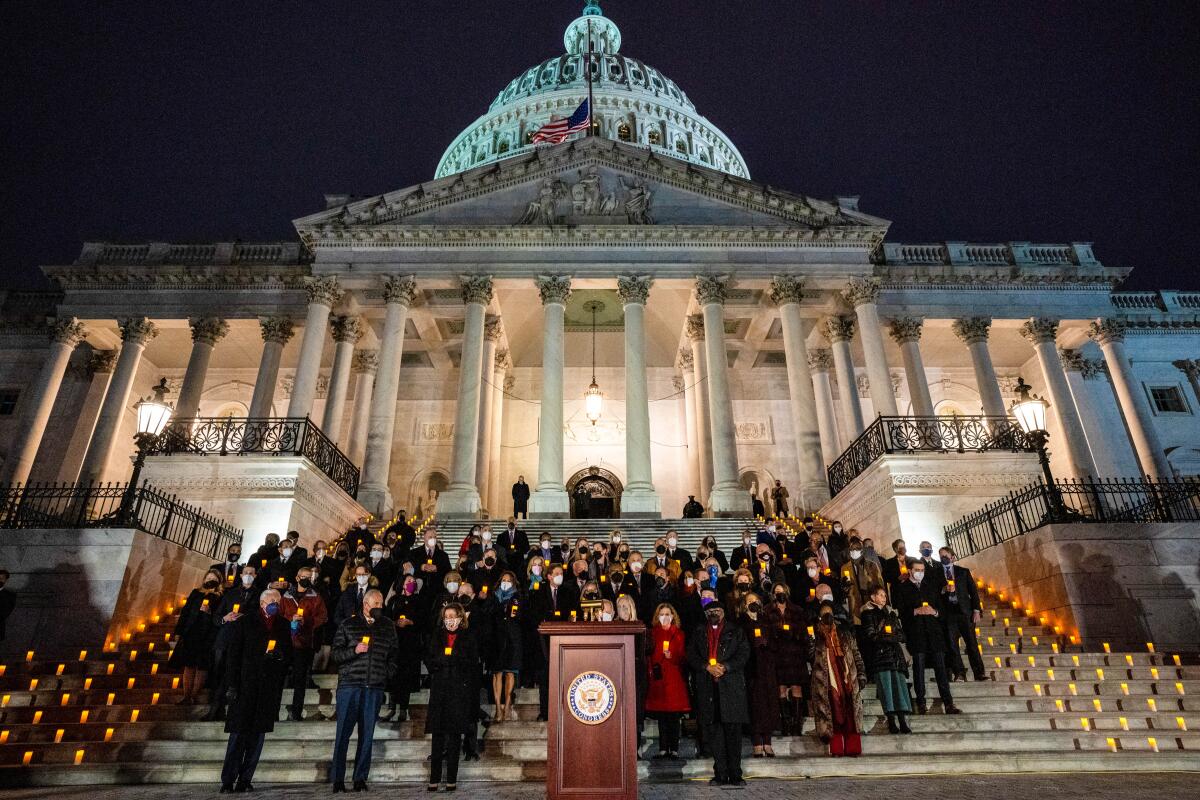
- Share via
WASHINGTON — The anniversary of the Jan. 6 attack on the U.S. Capitol brought no sense of healing to a country that remains deeply divided over the deadly riot, with the nation’s leaders failing to demonstrate a shared commitment to American democracy.
Although Democrats marked the day with commemorations, a moment of silence and a prayer vigil, almost no Republicans participated — a reminder of how few are willing to confront former President Trump’s lies about the last election. Trump himself issued a series of reality-defying statements, even urging supporters to “never give up” in their fight to return him to power.
President Biden, meanwhile, appealed to Americans to reject political violence in a speech inside the Capitol, telling them that “you can’t love your country only when you win.”
President Biden’s first year is dominated by tension between his vow to return the U.S. to normal and the reality that Trump changed it profoundly.
The president seems to have reluctantly accepted that the wounds of Jan. 6 will not heal on their own, signaling that he will play a more active role in confronting the falsehoods that have eroded faith in the elections that provide the foundation of American government.
“I did not seek this fight brought to this Capitol one year ago today, but I will not shrink from it either,” he said in Statuary Hall, where one year ago rioters roamed among statues of historic figures from the country’s past. “I will stand in this breach. I will defend this nation. And I will allow no one to place a dagger at the throat of our democracy.”
It was a fiercer speech than Biden had previously delivered on the subject, and one that directly addressed Trump’s central role in inciting the attack and the election falsehoods that fueled it.
“He values power over principle,” Biden said. “Because he sees his own interest as more important than his country’s interest, than America’s interest. And because his bruised ego matters more to him than our democracy or our Constitution.”
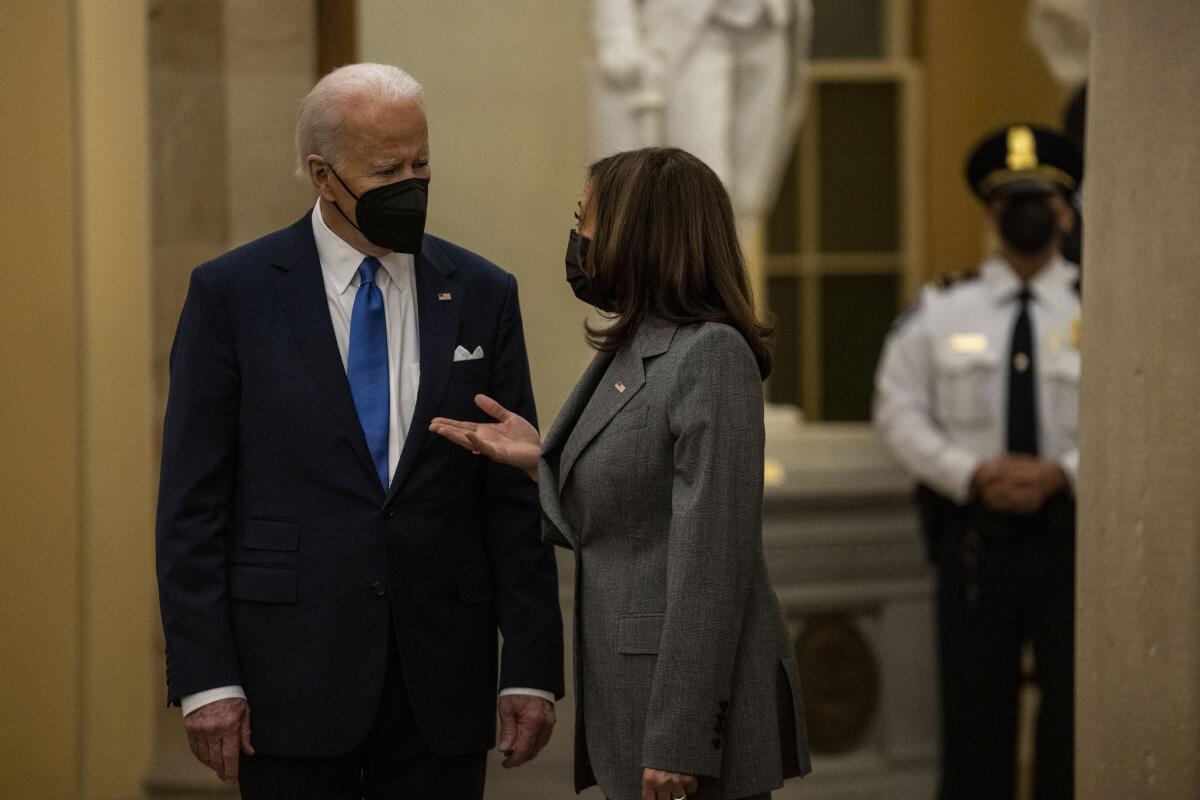
Vice President Kamala Harris, who spoke before Biden, said that “certain dates echo throughout history,” placing Jan. 6 in the same tragic lineage as the Sept. 11, 2001, terrorist attacks and the Dec. 7, 1941, bombing of Pearl Harbor during World War II.
She described the rioters as “extremists” who assaulted “the institutions, the values, the ideals that generations of Americans have marched, picketed and shed blood to establish and defend.”
But finding common cause — particularly across partisan lines — could prove difficult, if not impossible.
Most Republican voters believe Trump’s lies that the last election was rigged or marred by voter fraud, according to public polling. Right-wing commentators routinely downplay the extent of the violence on Jan. 6, in which rioters engaged in hand-to-hand combat with police. Five people involved died, including a Capitol Police officer, and more than 140 officers were injured; four other officers died by suicide after the siege.
Twenty-eight members of Congress who were trapped in the House gallery on Jan. 6 — all Democrats — formed the ‘Gallery Group’ to help one another through their trauma.
When the House of Representatives held a moment of silence on Thursday, the only Republicans on the floor were Rep. Liz Cheney of Wyoming and her father, former Vice President Dick Cheney, who served as a congressman decades ago.
The building was quieter than usual because Congress had no votes scheduled, and many lawmakers were not expected to be in Washington.
Some Democrats decided to be in town, saying that it was important to have a presence on Capitol Hill and commemorate the day, particularly because of the GOP efforts in the last year to downplay the violence.
“When I walked into the Capitol one year ago today, I never imagined I would be on my hands and knees with staffers, colleagues, reporters, cameramen, all hoping we got out safely,” Rep. Robin Kelly of Illinois said in one of a series of testimonials by House Democrats. She recalled thinking, “Is this the end for me?”
Rep. Jason Crow (D-Colo.), who, like Kelly, was among 30 or so lawmakers trapped in the gallery above the House floor on Jan. 6, encouraged Americans to turn their anger over the events of that day into action.
“We could have lost our democracy in 2021, but we have the opportunity in 2022 to save it. Let’s make it a year of democracy in action: volunteer, advocate and engage,” he said. “Now is the time for all good men and women across our nation to come to the aid of their country.”
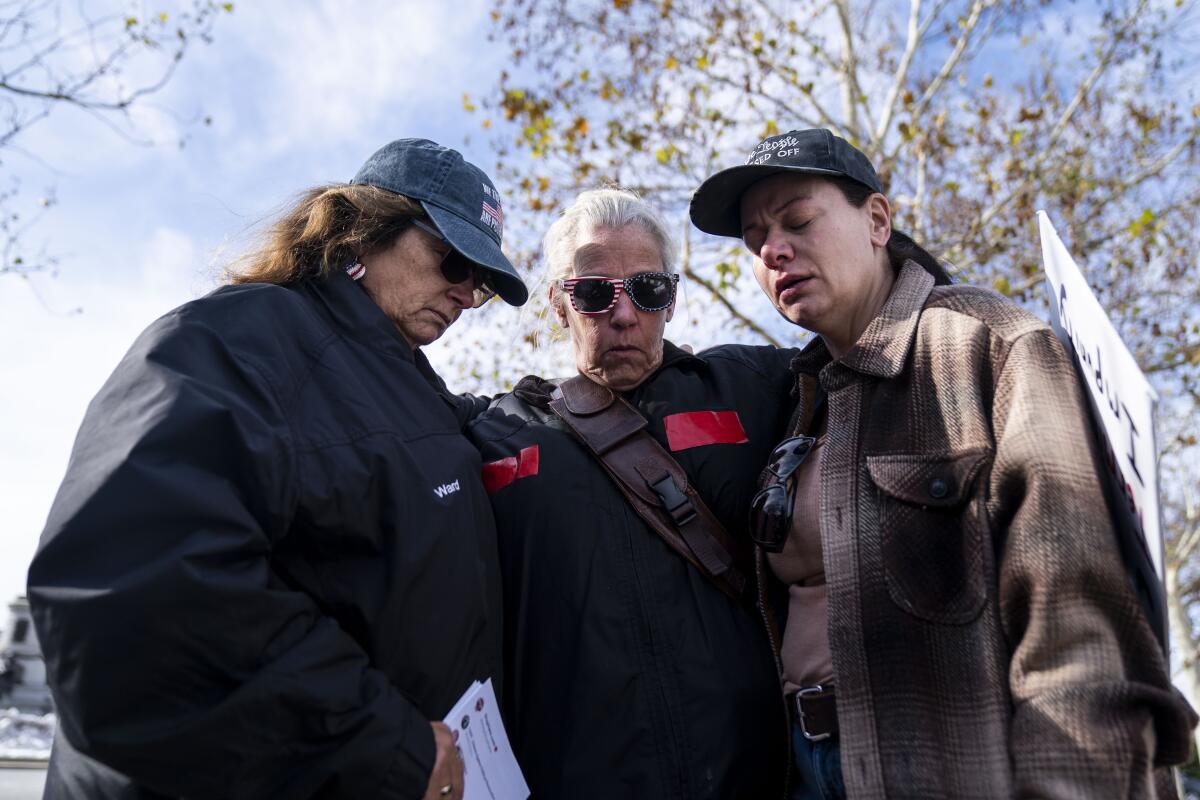
Democrats invited three historians, including the librarian of Congress, to hold a discussion about the attack as a way to solidify the record of the day’s events at a time when they have been subjected to political bickering.
“We have to retell the story of what happened on Jan. 6 with all of the gaps filled in,” said historian Doris Kearns Goodwin, adding that people must be “persuaded that this cannot happen again,” but that they must also confront “what’s going on in the country that made this possible to happen.”
At the end of the day, House Speaker Nancy Pelosi (D-San Francisco) and Senate Majority Leader Charles E. Schumer (D-N.Y.) held a prayer vigil on the steps of the Capitol.
One year later, the lies that fueled the Jan. 6 attack remain deeply embedded in American politics.
Many Republicans were absent. Senate Minority Leader Mitch McConnell (R-Ky.) and others were out of town for the funeral of former Sen. Johnny Isakson, who died last month.
In a statement, McConnell did not mention Trump, even though last year he said Trump was “practically and morally responsible for provoking the events of the day.” He called Jan. 6, 2021, “a dark day for Congress and the country” and admonished the “criminals who brutalized police officers and used force to try to stop Congress from doing its job.”
The minority leader also castigated Democrats, who have argued that Trump’s attempt to overturn the election bolsters the need to protect voting rights by carving out an exception to the filibuster, a maneuver that generally requires 60 votes to pass legislation in the Senate. Because the Senate is evenly divided between the two parties, Democrats stand little chance of enacting some of their key proposals without changing the rule.
“It is especially jaw-dropping to hear some Senate Democrats invoke the mob’s attempt to disrupt our country’s norms, rules and institutions as a justification to discard our norms, rules and institutions themselves,” McConnell said.
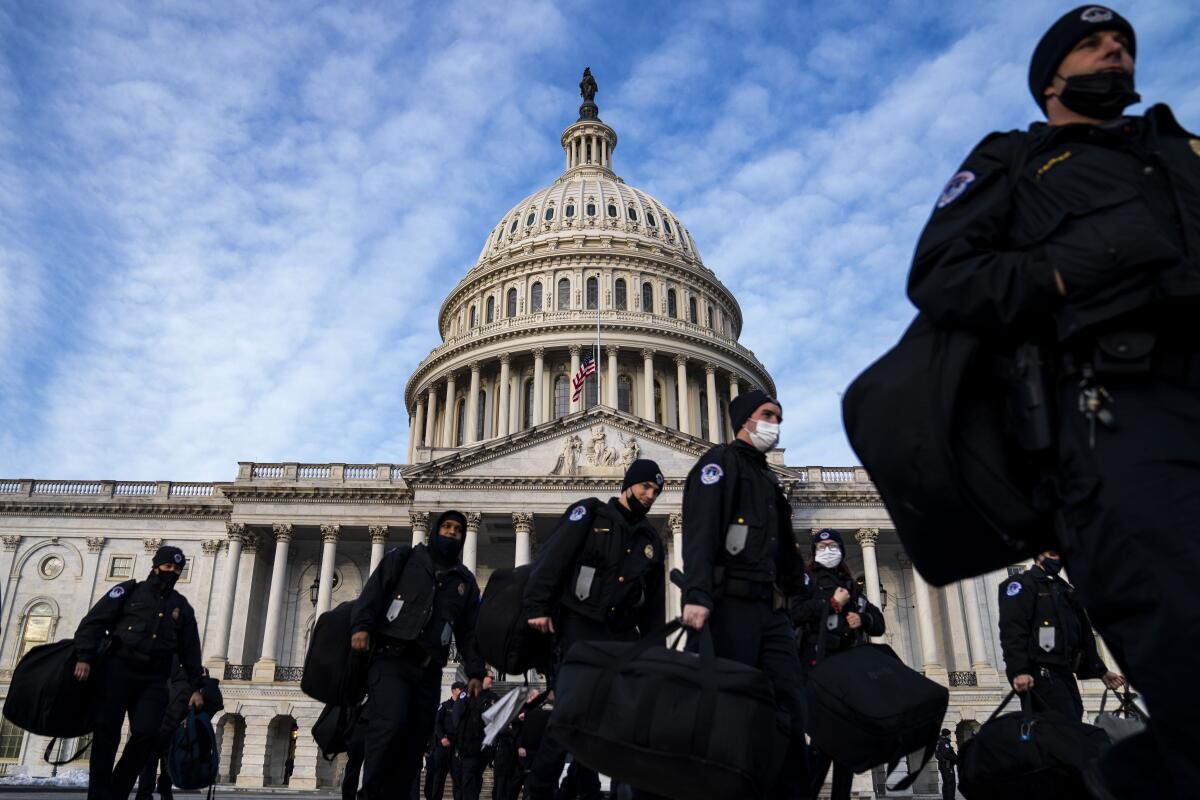
The only Republican-led event on Capitol Hill was hosted by Reps. Marjorie Taylor Greene of Georgia and Matt Gaetz of Florida, two of Trump’s most outspoken allies. They used the anniversary to share baseless theories that the attack on the Capitol was covertly instigated by federal authorities, a conspiracy theory that has also been aired by Fox News host Tucker Carlson.
House Minority Leader Kevin McCarthy (R-Bakersfield), who initially criticized Trump after the Jan. 6 attack but soon acquiesced to his continued leadership role within the party, said in a Facebook post that “those who broke the law” during the riot should be held accountable. But he blamed Democrats for not “answering the central question of how the Capitol was left so unprepared,” and he accused them of using the anniversary “as a partisan political weapon to further divide our country.”
Trump had planned to hold a news conference at Mar-a-Lago, his Florida resort, but canceled it earlier this week. He falsely described the last presidential election as “the Crime of the Century” and promised to “discuss many of those important topics” at his next rally, scheduled for Jan. 15 in Arizona.
Shortly after Biden finished speaking, Trump issued a statement repeating his lies about the election having been stolen from him.
“This political theater is all just a distraction for the fact Biden has completely and totally failed,” he said.
Times staff writers Erin B. Logan and Anumita Kaur contributed to this report.
More to Read
Get the L.A. Times Politics newsletter
Deeply reported insights into legislation, politics and policy from Sacramento, Washington and beyond. In your inbox three times per week.
You may occasionally receive promotional content from the Los Angeles Times.
